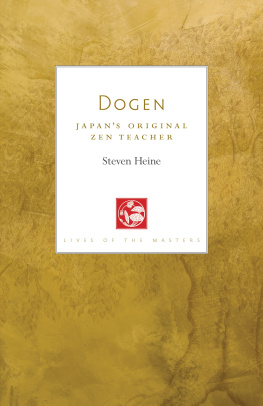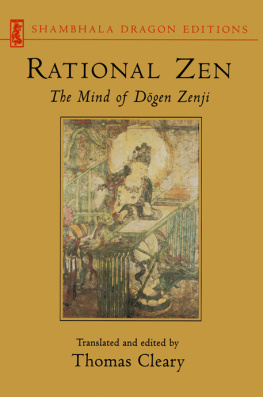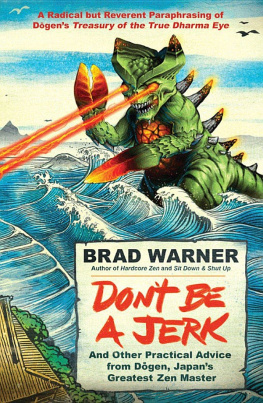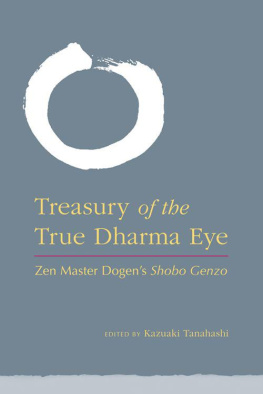Dogen Zenji Goroku
Record of Sayings of Zen Master Dogen
Introduction
Zen is traditionally called a separate transmission outside doctrine, pointing directly to the human mind to see its essential nature and realize enlightenment. The distinction between experience and doctrine is emphasize in the Lankavatara sutra, a scripture associated with the founding of Zen in China, which says that Buddhism is not a set of doctrines, but doctrines are expedients of Buddhism, like specific remedies for particular ailments.
The essential nature of mind, the central initiatory experience of Zen, refers to the mind untrammeled by acquired mental habits, opinions, and prejudices ingrained by personal history and cultural conditioning. A classic illustration of this likens mind and essential nature to ice and water; the ice represents mind frozen into habitual patterns of thought and feeling molded by circumstances, water represents the original fluid nature of the essence of awareness.
The initial disentanglement and awakening of pristine awareness is followed by what is called nurturing the sacred embryo, maturing the ability to remain unfettered while mastering deliberate use of mind, so that one becomes free to go or stay, able to let go or hold fast, to go against the current or go along, adapting to conditions independently.
Zen arose in China (where it is pronounced Chan) several centuries after the introduction of Buddhist scriptures from India and Central Asia, but Zen lore envisions its special transmission outside doctrine continuing from the time of the historical Buddha a thousand years before its introduction to China. Zen was likewise established in Japan as an independent movement hundreds of years after the introduction of the scriptural Buddhist teachings from Korea and China. This pattern of preparation was also recapitulated in the lives of many distinguished Zen masters, who entered into Zen after many years of study and practice of the scriptural teachings. One of the outstanding Japanese masters who went to China after long study of doctrine and returned to establish a Zen school in the thirteenth century was the famous Dogen Zenji, whose goroku, record of sayings is presented here in English for the first time.
Born into an aristocratic family in the year 1200, Dogen was taught literary Chinese at an early age and groomed to become a courtier in the old imperial system of Japan. At that time the dominant political authority in Japan had been usurped by military clans, and Dogen abandoned the path to court service in his thirteenth year, on the eve of his debut. Taking refuge with an uncle in Buddhist orders, he eventually became a monk in the powerful Tendai school, where he studied both exoteric and esoteric systems. After some years he was directed to a master of a newly established school combining Tendai with Zen, and was eventually given recognition as a master of Zen. Subsequently he traveled to China with his Zen teacher to seek further enlightenment from Chan masters on the continent.
At that time northern China was ruled by Mongolian warlords, limiting Dogens access to traditional Chan centers, but he met several masters of the residual Southern Song dynasty. Chinese Chan records of the time abound in laments over the degenerate state of the school, which was already over six hundred years old, and Dogen too was not satisfied with the teachers he met, until he was finally directed to master Rujing (pronounced Nyojo in Japanese) on Mt. Tiantong (Tendo). Rujing impressed Dogen greatly and accepted him as a disciple.
According to the Japanese Zen classic Denkoroku, Records of Transmission of Light, a collection of enlightenment stories tracing a succession of masters from India to China to Japan, Dogen studied with Zen master Rujing. Once during meditation sitting late at night Rujing said to the assembly, Zen study is the shedding of mind and body. Hearing this, suddenly Dogen was greatly enlightened. He went right to the abbots room and lit incense. Rujing asked him, Why are you burning incense? Dogen said, My body and mind have been shed. Rujing said, Body and mind shed, shed body and mind. Dogen said, This is a temporary bywaydont approve me arbitrarily. Rujing said, Im not. Dogen said, What is that which isnt given arbitrary approval? Rujing said, Shedding body and mind. Dogen bowed. Rujing said, The shedding is shed.
The author of Denkoroku , Keizan, a master in the fourth generation of Dogens lineage, explains, Comprehend thoroughly, investigate and penetrate completely, and you will know there is a body that has no skin, flesh, bones, or marrow. This body cannot be shed even if one tries to shed it; it cannot be abandoned even if one tries to abandon it. Therefore this realm is referred to by the expression, when all is exhausted, there is a place that cannot be emptied. If you can understand thoroughly, you wont doubt what the Zen masters and Buddhas say. What is the principle? Clear as pure light, no inside or outsideis there any body or mind to be shed?
In Keiso Dokuyaku, Poison from a Thorny Thicket, Zen master Hakuin gives a more detailed story of Dogens meeting with Rujing and the practice of shedding body and mind. According to this account, On the second day of the seventh month of the year 1225, Zen master Dogen of Eihei went far away to China along with Dharma master Myozen on a merchant ship. Meeting Zen master Rujing on Mt. Tiantong, he made three prostrations and said, This insignificant person from a distant region has been fortunate enough to be able to sit in on your teaching; please be so very kind and so very compassionate as to point out what is most essential. Rujing lit incense, joined his palms, and said, This Chan school of ours, ever since it has been accurately transmitted, has been rooted in not leaving the meditation hall, considering just sitting to be genuine practice. Now in many places it often happens that even though they concentrate on long sitting without lying down, they dont meet enlightened teachers and do not learn the right way to enter absorption, so theirs is no different from the sitting meditation of outsiders. How can they ever, ever manage to enter the great absorption of the Buddhas? Dogen then made three prostrations and said, Please be so very kind and so very compassionate as to point out the right way to enter absorption. Rujing lit incense, joined his palms, and said, When you sit meditating you should put your mind in your left palm. Dogen then made three prostrations and left. One day Dogen went to Rujings room, made three prostrations, and said, Following your directions, I put my mind in my left palm; now both hands have disappeared, and theres no place to put my mind. Rujing lit incense, joined his palms, and said, You should make your mind fill your whole body, not leaving a single point empty in your three hundred and sixty joints and eighty-four thousand pores. One day Dogen went into Rujings room, made three prostrations, and said, Following your directions, I put my mind in my whole body. Now my mind and body have both dropped off, and its like the disk of the sun shining in an endless sky, with not even the form of a disk being seen. Rujing lit incense, joined his palms, and said smiling, Having flowed around in birth and death for countless eons, today you have finally entered genuine untainted great meditation absorption. Keep it real, and dont lose it. Dogen prostrated himself three times, and three times again, then left weeping. This is the secret of the Soto sect.
Another exchange between Dogen and his teacher Rujing symbolically illustrating the Zen process is related in the record of sayings of Rujing, reported by Dogen himself. Dogen asked Rujing, When there is not a fleck of cloud in the blue sky, how is that? Rujing said, Still only half the issue. Dogen asked, How is it when the whole issue is brought up? Rujing said, After the accomplishment of clear sky is consummated, one step, then another. Dogen said, The autumn is somber, the mountains denuded, the moon descends in the deep sky. Rujing said, This still has congealment. Dogen bowed. Rujing said, Go.
Next page





